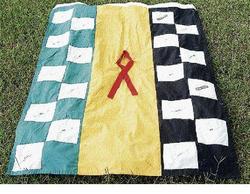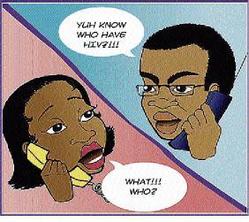Keisha Shakespeare-Blackmore, Staff Reporter

This week, Flair begins a new series that focuses on the real stories of persons living with HIV/AIDS. Keisha Shakespeare-Blackmore will go in-depth with adults, children and caregivers, as well as look at the work being done by Jamaica AIDS Support for Life. We hope you find the series useful and informative, but best of all, we hope it helps to eliminate the discrimination against persons living with HIV/AIDS.
Bettyis HIV positive. When she was diagnosed seven years ago, she became a victim of stigma and discrimination, even from her own relatives. She now belongs to a support group of individuals living with HIV who are speaking out against stigma and discrimination.
After her relatives found out she was positive, her own sister told everyone in the community. As such, she was put out of her home with her two children and it was a neighbour who came to her rescue.
"She put me and my daughter up. But she could not take my son because she had a daughter and worried about who would watch my son after I take my medication and fall asleep," she said. With tear-filled eyes, she continued, "He had to walk up a hill at nights to stay with his grandmother. But she told him he could not sleep on any of her beds, so he had to sleep on the floor."
Unlucky situation
She notes that currently, she does not have a good relationship with her relatives but from her unlucky situation, she has met good friends. She told Flair that once, a group of students attempted to beat her daughter but the principal intervened. The child had to be moved from that school but is now doing well at another institution.
But for Betty, life is not so smooth. Even now, she is going through hell with a very unkind woman. And it has reached the point where she even contemplates hiring someone to 'get rid of her'.
Liz's story
Liz, too, is HIV positive. As she sat back in the chair, she said she was not feeling so well, but in a voice barely above a whisper, she told Flair her story.
"I was in a good job at a hospital and I lived in a nice house and when I was diagnosed, I lost my job, my house, family and friends, said Liz.
With a look of despair, she continued, "I had to live in a house made from tarpaulin."
However, her countenance began to change as she spoke about being blessed by God. "Now, I am highly blessed because someone gave me a piece of land and I started my house, but it's not finished yet. You see, my family forsake me but God has not forsaken me. From you have Jesus, you have everything."
She said that when she was first diagnosed, she wanted to end her life. "I wanted to jump like the man did down Kingston Public Hospital. But I could not do it because I wondered what would happen to the children."
As far as her relatives are concerned, she does not care much whether they accept her because she has now found better friends in the support group. "These people now are my family; I talk to them and they encourage me. Also, the nurses here are so good to us. One of them even takes the children home for weekends sometimes."


Melissa's story
Melissawas more than eager to share her experience as well. She notes that she is afraid of people finding out that she is HIV positive. "The thing is that even family members use it to curse you when they find out," she said.
"I had a very good friend until I told her of my condition. We worked together, we used to share everything, eat and drink from the same cup, but after I told her, I realised she didn't want to do those things again. She doesn't really want to eat from me either."
Liz says she told her friend that they were better friends before she made her revelation. She added that people from her old neighbourhood are speculating as to whether she is positive. Some of them say the reason she is fat is that she's on medication. Currently, she has moved from that neighbourhood and is now living in an area where no one knows her status.
Ironic situation
However, a neighbour from her new community came to her telling her that she heard that a young woman in the community is positive. As she relayed the story, she laughed at how ironic the situation is. "She came up to me and said, 'you hear sey so and so have AIDS?' I said no, she said, 'mi just tell mi children dem not to go over there or eat from her again'. But she eat from me," Liz said with a laugh.
A few members of the group were fortunate not to face discrimination from relatives, such as Johnand Paul. They both say they have strong family support. However, Paulrecently had a run-in with a doctor who was very insensitive.
"My girlfriend is now pregnant and she went to the doctor who took up her docket and without examining her, prescribed medication. The medication he gave her could have caused her to lose the baby," he said with disgust. He said he told his girlfriend not to take it and he was very displeased with the way the doctor handled the matter.
Sensitise caregivers
Dounette Wellington, support service coordinator at the Jamaica AIDS Support, said they have workshops to sensitise caregivers and family members against stigma and discrimination.
"Currently, not all family members of those living with HIV have been notified. Some relatives will come around but others will outright say they are not dealing with it."
She notes that, currently, a lot of individuals are on medication so they are looking and feeling much better and are not easily identified. This reduces the stigma and discrimination of how people perceive individuals living with HIV/AIDS. She said there is a 50/50 ratio as it relates to those who discriminate and those who accept.
Very remorseful
She notes one particular case where someone came in and was found positive. He admits that he usually discriminated against those living with HIV/AIDS but now he is very remorseful. "He told me that he cannot disclose his status to his family members or friends because everyone knows that he was one who discriminates," said Wellington. She said that Jamaica AIDS Support For Life also goes into schools, churches, communities and hosts workshops to sensitise people on HIV/AIDS.
Names changed to protect identity.
Send feedback: keisha.shakespeare@gleanerjm.com.

